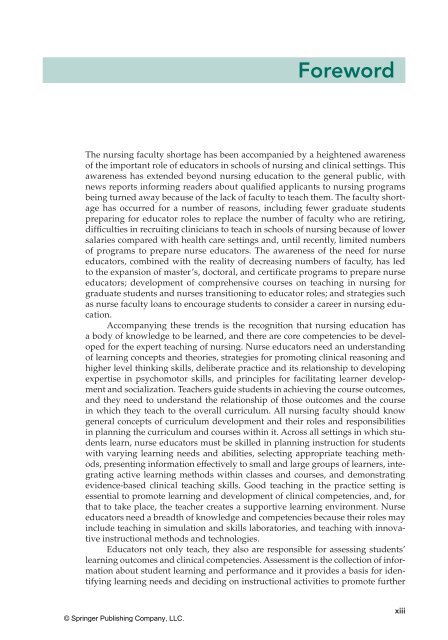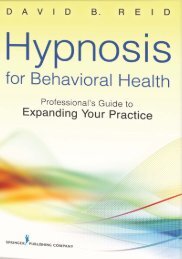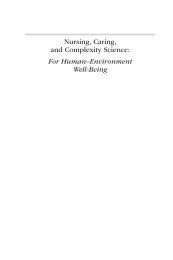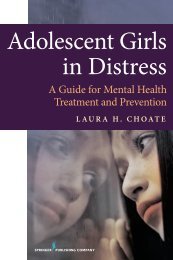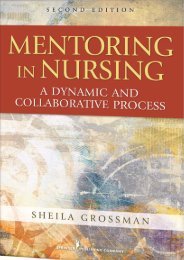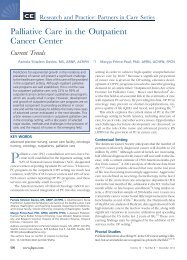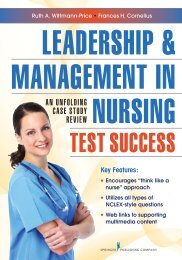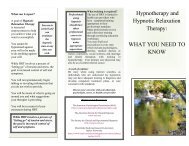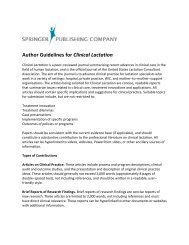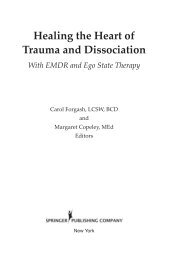Download - Springer Publishing
Download - Springer Publishing
Download - Springer Publishing
You also want an ePaper? Increase the reach of your titles
YUMPU automatically turns print PDFs into web optimized ePapers that Google loves.
Foreword<br />
The nursing faculty shortage has been accompanied by a heightened awareness<br />
of the important role of educators in schools of nursing and clinical settings. This<br />
awareness has extended beyond nursing education to the general public, with<br />
news reports informing readers about qualified applicants to nursing programs<br />
being turned away because of the lack of faculty to teach them. The faculty shortage<br />
has occurred for a number of reasons, including fewer graduate students<br />
preparing for educator roles to replace the number of faculty who are retiring,<br />
difficulties in recruiting clinicians to teach in schools of nursing because of lower<br />
salaries compared with health care settings and, until recently, limited numbers<br />
of programs to prepare nurse educators. The awareness of the need for nurse<br />
educators, combined with the reality of decreasing numbers of faculty, has led<br />
to the expansion of master’s, doctoral, and certificate programs to prepare nurse<br />
educators; development of comprehensive courses on teaching in nursing for<br />
graduate students and nurses transitioning to educator roles; and strategies such<br />
as nurse faculty loans to encourage students to consider a career in nursing education.<br />
Accompanying these trends is the recognition that nursing education has<br />
a body of knowledge to be learned, and there are core competencies to be developed<br />
for the expert teaching of nursing. Nurse educators need an understanding<br />
of learning concepts and theories, strategies for promoting clinical reasoning and<br />
higher level thinking skills, deliberate practice and its relationship to developing<br />
expertise in psychomotor skills, and principles for facilitating learner development<br />
and socialization. Teachers guide students in achieving the course outcomes,<br />
and they need to understand the relationship of those outcomes and the course<br />
in which they teach to the overall curriculum. All nursing faculty should know<br />
general concepts of curriculum development and their roles and responsibilities<br />
in planning the curriculum and courses within it. Across all settings in which students<br />
learn, nurse educators must be skilled in planning instruction for students<br />
with varying learning needs and abilities, selecting appropriate teaching methods,<br />
presenting information effectively to small and large groups of learners, integrating<br />
active learning methods within classes and courses, and demonstrating<br />
evidence-based clinical teaching skills. Good teaching in the practice setting is<br />
essential to promote learning and development of clinical competencies, and, for<br />
that to take place, the teacher creates a supportive learning environment. Nurse<br />
educators need a breadth of knowledge and competencies because their roles may<br />
include teaching in simulation and skills laboratories, and teaching with innovative<br />
instructional methods and technologies.<br />
Educators not only teach, they also are responsible for assessing students’<br />
learning outcomes and clinical competencies. Assessment is the collection of information<br />
about student learning and performance and it provides a basis for identifying<br />
learning needs and deciding on instructional activities to promote further<br />
© <strong>Springer</strong> <strong>Publishing</strong> Company, LLC.<br />
xiii


